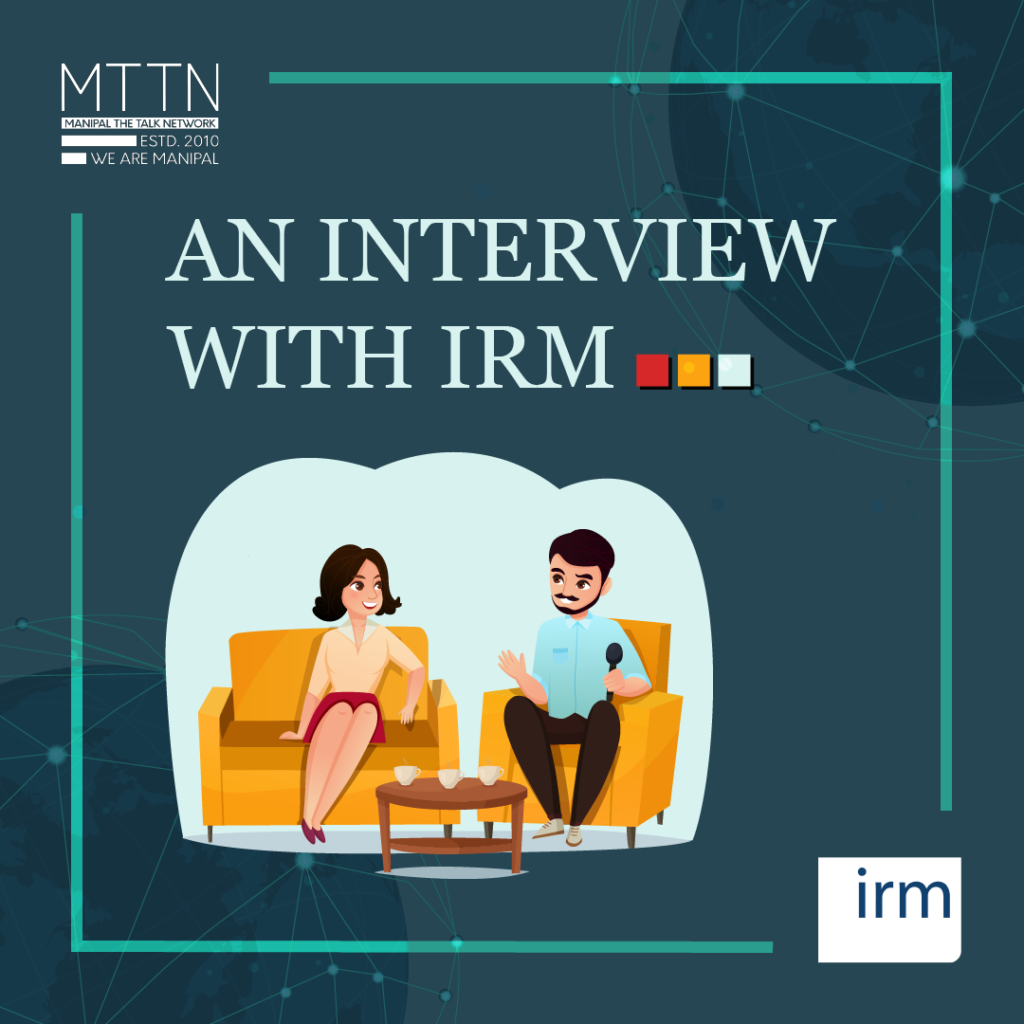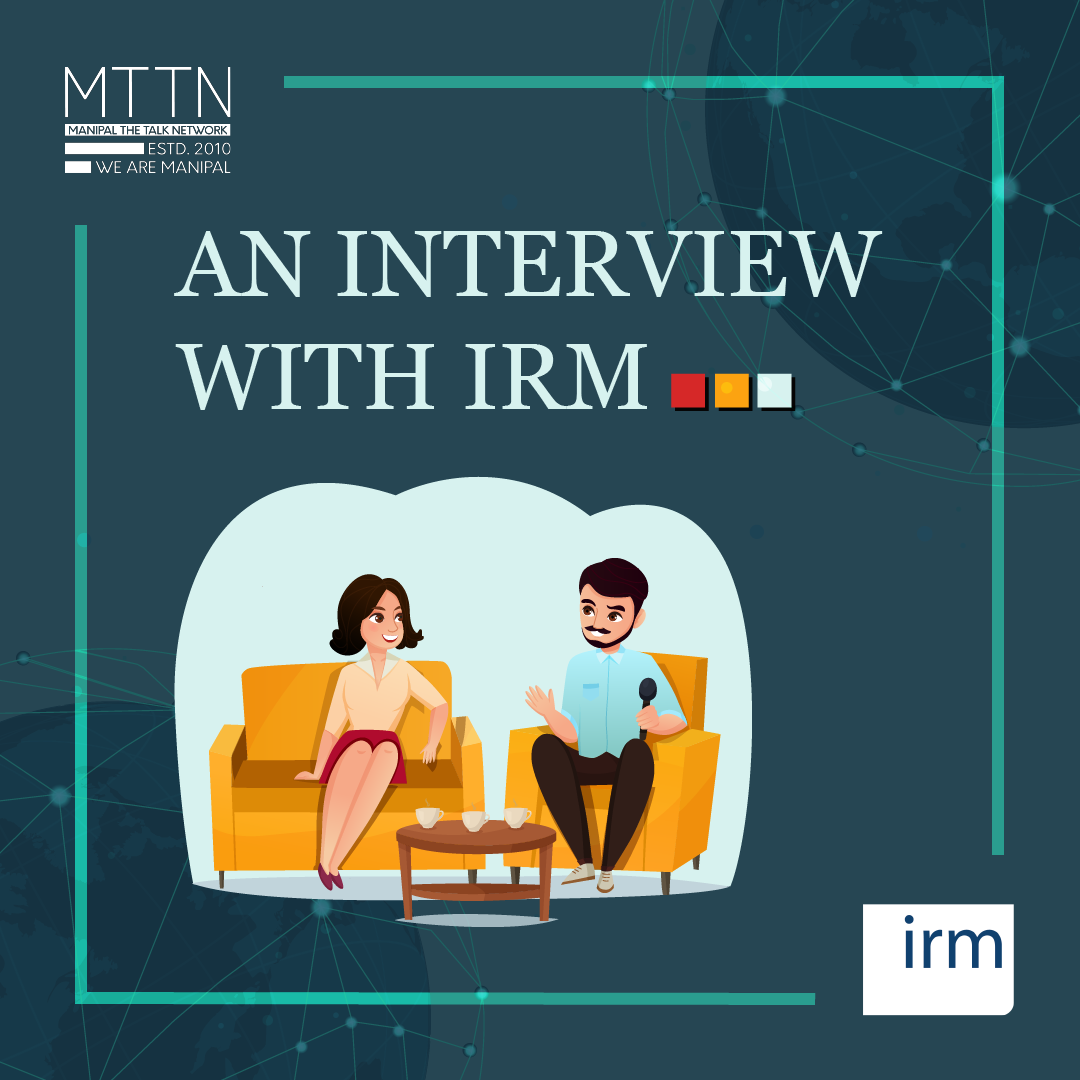
The Institute of Risk Management (IRM) is the leading professional body for Enterprise Risk Management (ERM) qualifications, examinations, and research. IRM is committed to expanding its global enterprise risk management ecosystem in India with the highest standards of education and knowledge that improves outcomes for organizations through IRM qualified risk professionals. We at MTTN had the opportunity to interview Ms. Kosha Shah, Head of Academics and Corporate Alliances at IRM India to learn all about IRM, enterprise risk management, and career application of the same.
MTTN- We would like to begin by asking what is IRM and how did it come about?
Kosha-The Institute of Risk Management, headquartered in the United Kingdom, is the world leader in enterprise risk management (ERM) qualifications and examinations, globally recognized in 143 countries. IRM has been driving excellence for over 30 years across 143 countries with 5000+ examination centers worldwide. With the India Chapter, students can now sit for the examinations at any of the 360 exam centers across India. IRM’s 5-Level professional qualifications with designations are globally recognized across industries and can be pursued simultaneously by students alongside their graduation / post-graduation.
MTTN– So what exactly is risk and risk management?
Kosha– In theory, the risk is the effect of uncertainty on the objectives. When you are taking any business decision, you need to keep room for uncertainties that may have an impact on the objectives of your organization, whether this organization is a startup, a family business set up, or a department/sector of company you are working at. Traditionally people have always looked at risk from an insurance or a finance perspective. While both these are important, enterprise risk management goes beyond finance and insurance and covers risks across the entity in all departments and all sectors, including supply chain, operations, human resources, marketing, branding & reputation, research & development, treasury, sales, and much more.
MTTN– For instance, if someone wants to get into the pharma industry, does this qualification also cover the risks and management of challenges faced in the pharma industry?
Kosha– ERM helps you manage risks across all sectors and departments of an organization. Talking about the pharma industry, you will be glad to know that the people taking up the qualifications come from various backgrounds including it pharma, management, law, engineering, technology, arts, mass media, or even fashion. Whether you want to pursue a career in risk or not, IRM’s qualifications are relevant for startups, family businesses, and the industry.
MTTN– Is it necessary to pursue a career in the risk sector after taking up this qualification
Kosha– A candidate doesn’t need to pursue a full-time career in the risk sector to take up this qualification. In today’s complex environment, the risk is present in everything we do. One cannot look at risk only from a finance or insurance perspective. Enterprise risk management goes beyond finance and insurance and covers procurement, supply chain, research, operations, human resources, sales, and much more. Whether you are looking to make a career in the risk sector or not, IRM’s qualifications in Enterprise Risk Management are relevant for startups, family businesses, and the industry.
MTTN– How are level 1-5 exams/ qualifications in ERM equipping students to effectively deal with risk? What are the differences between the levels?
Kosha– IRM’s qualifications equip candidates with complex problem-solving, decision-making, critical thinking skills, and knowledge that is needed to survive in the uncertain world today. Our qualifications cover 40% of the World Economic Forum’s growing skills.97% of IRM students and members agree that they can think from a risk perspective and have an analytical approach towards situations.
The qualification is divided into five levels. IRM’s qualifications are valid for time and candidates can take each level gradually. Candidates earn a professional designation at every stage after Level 2 i.e. IRMCert (Level 2); GradIRM (Level 3); CMIRM(Level 4); CFIRM(Level 5). Candidates begin their formal career at Level 1 which is the Fundamentals of Enterprise Risk Management. The Level 1 examination is held quarterly i.e. February, May, August, and November. The Level 1 examination (MCQ based) is an online proctored examination to be taken at your convenience from home itself. The fee includes study material along with living study support sessions delivered by industry experts.
The Level 2 examination is conducted twice a year – June & November. The Level 2 qualification which comes with a formal designation (IRMCert), covers two options: General Enterprise risk management or Financial Services Risk Management. Candidates can appear for the Level 2 Examination (MCQ based) at any one of our 360+ Exam Centres across India. On successful completion of the Level 2 examination, candidates earn a professional designation – IRMCert, which is equivalent to a graduation degree and is globally recognized in 143 countries.
The Level 3 qualification is based on case studies and research and is spread over 12 months. Candidates must submit a research paper as part of their final assessment.
Level 4 and Level 5 qualification is based on work experience and application.
MTTN– Is access to the Level 1 study resources for a lifetime or just for the course duration?
Kosha– On completion of the live study support sessions for the Level 1 examination, candidates will have access to the recordings of these sessions until the examination. Study resources are available for download and accessible for a lifetime.
MTTN– What does a job in ERM entail and how is it different from Professional Risk Management (PRM) or insurance risk?
Kosha-The career application of qualification in enterprise risk management are as big 4 consulting firms in risk management, risk-based assurance in consulting and auditing firms, strategic risk management at consulting firms, credit rating agencies in risk management teams, risk and credit teams at banks/NBFCs, industry – FMCG, Pharma, Retail, Financial Services, Technology, Manufacturing, Agriculture, Steel – all listed, large companies have a risk management department as per requirement by SEBI/RBI/Companies Act 2013, start-ups, family-owned businesses, SMEs – new scope in a post-crisis world as most businesses are setting up a risk and crisis team
Historically, the concept of risk management has always been associated with finance, compliance, and insurance. However, for the survival of businesses in today’s complex environment, a robust and holistic approach towards risk management, commonly known as Enterprise risk management (ERM) is required. ERM focused on understanding the qualitative aspect of risk, gives you a 360-degree approach to risk management, beyond finance and insurance. The Institute of Risk Management (IRM), is the world’s leader in enterprise risk management qualifications [Level 1 to Level 5]. Whether you want to pursue a career in the risk sector or not, IRM’s global qualifications are relevant for startups, family businesses, and the industry.
PRM certification is focused on the quantitative and financial aspect of risk management, whereas Insurance Risk deals with a range of risks that the insurance company has agreed to provide indemnity for.
MTTN– Could you elucidate the role of a CRO in a company from a day-to-day basis?
Kosha- A chief risk officer has become a crucial resource during the coronavirus pandemic as many businesses face a wide range of operative threats to their processes and their workforces. CRO’s identify key risks, assess a company’s ability to take risks, and plan for recovery and resilience. The complex role of a CRO demands skills such as analytical knowledge to evaluate varied business decisions ranging from supply chains to staffing, relationship management expertise to maintain dealings with law firms, insurance brokers, and industry peers, power of persuasion, accountability to government regulators, etc.
.
MTTN– How can strategies in risk management be extrapolated to other areas and other sectors and why is everyone required to be risk intelligent?
Kosha– Risk management is applicable across, no matter which sector, organization, or country the candidate works. IRM’s global qualifications equip candidates with complex problem solving, effective decision making and critical thinking skills and knowledge needed to succeed in a risky world
MTTN– For someone who wants to get into risk management. How long does it take to reach the level of a CRO and how the variable is the pay scale?
Kosha– Generally, about 12-15 years. As per a report published by Protiviti, a leading global consulting firm, organizations looking to hire a CRO, “should identify executives with at least 15 years of experience. Previous experience with the C-suite and reporting to boards is desirable, as is expertise in the risk of greatest importance to the enterprise (e.g., market risk in trading shops or investment banks, credit risk in banks, and commodity price risk in power companies). The CRO should be able to think strategically, work with operating units to disaggregate business plans and transactions into component risks the organization is taking on, and recommend how to improve proposed plans and transactions by mitigating the risks”.
The Financial Express recently quoted that risk is one of the top 10 highest paid jobs in India. As per external research, Chief Risk Officer earns 75 lakhs-3 Crores annually.
Interviewed by Ujwal Malladi for MTTN
Written by Shivangi Acharya and Kriti Gopal for MTTN
Edited by Nitya Sai T for MTTN
Artwork by @the_tenth_muse

Leave a Reply
You must be logged in to post a comment.